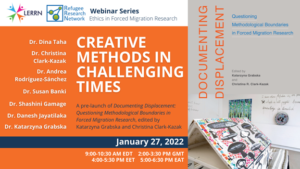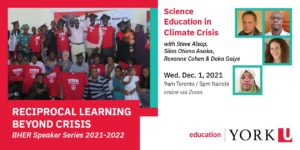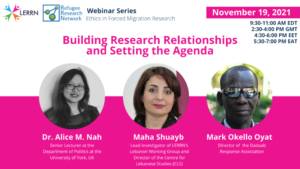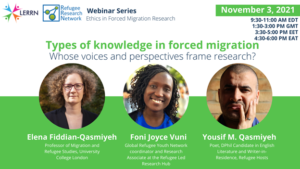The RRN Research Digest provides a synopsis of recent research on refugee and forced migration issues from entities associated with the RRN and others.
You can download the digest in PDF format here: RRN Research Digest No. 116
Recent Publications and New Research
Korntheuer, A., Hynie, M., Kleist, M., Farooqui, S., Lutter, E., & Westphal, M. (2021). Inclusive Resettlement? Integration Pathways of Resettled Refugees With Disabilities in Germany and Canada. Frontiers in Human Dynamics, 3. The purpose of this article is to explore the existing intersectional knowledge on integration and resettlement of refugees with disabilities in two of the top five resettlement countries in the world, Germany and Canada. There is limited research on the intersection of migration and disability, especially in the context of refugee resettlement. The review describes settlement programs in each country. The authors draw from the global literature around forced migration and disability, as well as disability and migration more broadly in each country, to enhance the limited existing research and conduct an intersectional analysis at the level of systems, discourses, and subjective narratives. Findings highlight three dominant themes that weave across all three levels: being a “burden” on society, being invisible, and agency and resistance. Finally, drawing from the theoretical stance of Disability Studies, critical and holistic integration theories, the authors discuss how this intersectional analysis highlights the importance of reshaping the policies, discourse and definition of integration, and the consequences this can have on research, service delivery, and evaluation of integration and resettlement.
Weidinger, T. (2021): Onward (Im)Mobilities and Integration Processes of Refugee Newcomers in Rural Bavaria, Germany. Erlanger Migrations- und Integrationsstudien 8. FAU University Press: Erlangen. This cumulative PhD thesis, comprised of five articles, sought to better understand the onward (im)mobilities and integration processes of refugee newcomers in rural areas in Germany, focusing on rural specificities in terms of settlement and integration. Accordingly, the analysis drew on the discursive framing of refugee settlement processes in rural areas, the residential and everyday (im)mobilities of refugee newcomers in rural areas, and the characteristics of mechanisms of socio-spatial exclusion and inclusion of forced migrants in rural areas in terms of everyday mobility and access to housing. Methodologically and ethically, the project aimed to develop and enhance research tools that can give voice to refugee newcomers and better integrate them into research processes.
Shapiro, S. (2021). Altruistic capital and refugee-background youth: Creating educational counter-stories and opportunities. Linguistics and Education. This theory-based article argues that the theme of altruism should be a central focus of educational research and practice with refugee-background (RB) students and families. The author suggests that altruistic capital, as a form of community cultural wealth (CCW), can be part of counter-storytelling oriented in Critical Race Theory (CRT), which can challenge deficit-oriented “master narratives” about RB students. The author draws on data from previously published research to illustrate the prevalence and power of altruistic capital in RB students’ lives. Finally, the article includes a heuristic of questions that can guide educational policy, instructional practice, and future research with RB students and other marginalized groups.
Chatty, D. (ed.)(2021). Special issue: Displaced Syrians. Journal of Refugee Studies 34(2). The articles presented here in this special issue on Displaced Syria emerged from a workshop held at The Institute of New York University in Abu Dhabi in March 2019. It aims to encourage an examination of the perceptions and aspirations of displaced Syrians and practitioners in hosting countries in the Levant, the Gulf, and in Europe with particular attention to the voices of the displaced, their reimagining of home and homeland, and the emerging transnational sense of identity and belonging.
Loftsdóttir, K. (2021). We Are All Africans Here: Race, Mobilities, and West Africans in Europe. Berghahn Books, New York. This book looks critically at the racialization of mobility in Europe, anchoring the aspiration of precarious migrants from Niger in Belgium and Italy. It contextualizes their experiences within the ongoing securitization of mobility in their home country and the persistent denial of racism and colonialism in Europe. The book is available in hardback and eBook, and the introduction can be read here.
Briefs, Reports and Resources
Donald Kerwin, José Pacas, and Robert Warren. Ready to Stay: A Comprehensive Analysis of the US Foreign-Born Populations Eligible for Special Legal Status Programs and for Legalization under Pending Bills, Center for Migration Studies, December 2021. This report offers estimates of US foreign-born populations that are eligible for special legal status programs and those that would be eligible for permanent residence (legalization) under pending bills. It seeks to provide policymakers, government agencies, community-based organizations (CBOs), researchers, and others with a unique tool to assess the potential impact, implement, and analyze the success of these programs. The report views timely, comprehensive data on targeted immigrant populations as an essential pillar of legalization preparedness, implementation, and evaluation. The report and the detailed estimates that underlie it, represent the first attempt to provide a detailed statistical profile of beneficiaries of proposed major US legalization programs and special, large-scale legal status programs.
Craig Damian Smith, Sean Rehaag, and Trevor C. W. Farrow. Access to Justice for Refugees: How Legal Aid and Quality of Counsel Impact Fairness and Efficiency in Canada’s Asylum System. SSRN, December 7, 2021. This report presents findings from a study exploring relationships between refugee legal aid, quality of counsel, the fairness and efficiency of asylum procedures, and access to justice for refugee claimants in Canada. This report aimed to understand how access to legal aid affects access to justice for claimants. This study employed a multi-method approach to collect data from stakeholder groups across Canada’s asylum system, including surveys, semi-structured interviews, and focus groups. Findings demonstrated that refugee claimants in Canada experience significant barriers to justice, which often begin at the outset of their procedures and persist through the asylum process. Representation rates are currently higher than for other tribunals, though funding for legal aid remains precarious over the mid and long-term. In that context, our most important finding is that the quality of representation is an urgent and long-standing issue. This issue currently has more significant impacts on efficiency, outcomes, and access to justice than the inability of claimants to secure counsel.
Regina Jefferies. Comparative perspectives on airport asylum procedures before and during the COVID-19 pandemic. Kaldor Centre for International Refugee Law, December 2021. This Policy Brief examines how different countries have dealt with international protection needs during the pandemic and provides guidance moving forward. It does so by reviewing the pre-pandemic use of airport asylum procedures in seven different countries (Australia, Canada, Costa Rica, Germany, Uganda, and the United States) and those countries’ subsequent use of border restrictions and/or closures in response to COVID-19. Reviewing a range of approaches, highlights persistent issues of transparency, procedural fairness, and accountability that pre-date – but have been exacerbated by – the pandemic. Finally, for measures suspending or limiting air travel, it identifies several recommended practices to ensure that States continue to meet their international protection obligations towards refugees and asylum seekers while also responding to public health concerns.
As part of a collaboration between CCR, CARFMS, CRS, and IASFM, several reference documents related to ethical considerations for research with people in forced migration have been developed. Your Rights in Research is an information sheet available in 20 translations for people who are asked to participate in research. It is intended to explain some of the vocabulary found in standard consent forms in lay person’s terms. It also outlines key considerations and resources, with particular attention to lived experiences of newcomers. The translations were funded by SSHRC and uOttawa and completed by Access Alliance Language Services, Ayar Ata, and Ulrike Krause, and collaborators. The CCR website has the ethical guidelines, the executive summary (with checklist), and most of the translations of “Your Rights in Research” in both English and French. Finally, the IASFM website has the International Code of Ethics in English, French and Spanish.
Sahar Atrache. Lebanon’s Deepening Crisis: The Case for a Sustainable Aid Response. Refugees International, December 2, 2021. Lebanon’s political and economic collapse has left hundreds of thousands of Lebanese and Syrian and Palestinian refugees struggling to make ends meet. At present, international and national aid organizations are striving to address the urgent needs of those disproportionally hit by the crisis. But humanitarian actors have neither the mandate nor the capacity to address root causes of the situation. Still, donors and international aid agencies should focus on durable solutions and make sure that their efforts address state capacities, are transparent, and empower local actors.
Lifesaving Humanitarian Response for Women and Girls in Afghanistan: An Urgent Call for U.S. Action. Refugees International, December 10, 2021. Violent conflict, a devastating drought, and food insecurity affecting over half the population in Afghanistan are driving one of the worst humanitarian crises in the world. Assessments indicate this emergency will exponentially grow as Afghanistan’s economy teeters on the edge of total collapse and the country remains almost entirely dependent on external aid. Urgent action is needed to address the looming famine and avert a humanitarian catastrophe that will impact women and girls and other marginalized groups the most.
News and blog posts
Sandra Sanchez, ‘Denial of Asylum Often Depends on the Region in Which Migrants Live, Report Finds’, Border Report, December 17, 2021. According to a Transactional Records Access Clearinghouse (TRAC) report, asylum seekers’ chances of prevailing in their cases vary dramatically based on where they live. The report finds that immigration courts in New York, San Francisco, Baltimore, Chicago, and Arlington, Virginia grant asylum at higher rates, based on an analysis of 223,469 total asylum decisions from 62 immigration courts and 492 immigration judges nationwide from 2016 to 2021. Conversely, courts in Houston, Atlanta, Oakdale, California, and Los Fresnos, Texas had some of the highest denial rates in the nation. TRAC also offers data on individual judges.
Madeline Gleeson, Australia’s asylum policy has been a disaster. It’s deeply disturbing the UK wants to adopt it. The conversation, December 7, 2021. Recently, at least 27 people drowned after their inflatable dinghy capsized while trying to cross the English Channel to the UK. While British Prime Minister Boris Johnson said he was “shocked and appalled and deeply saddened” by the tragedy, it will no doubt spur on efforts to rush through the country’s much-maligned Nationality and Borders Bill. This bill, which is being debated in the UK parliament again this week, seeks, among other things, to “deter illegal entry into the United Kingdom”. The sense of urgency mounting around this issue does not sweep aside the need for reasoned and rational policymaking.
Digital and social media
Seminar Series: Race, Borders, and Global (Im)mobility (January 19, 2022 – March 9, 2022) convened by Dr. Hanno Brankamp, Departmental Lecturer in Forced Migration, Refugee Studies Centre, University of Oxford. This series critically interrogates how militarized borders, migration enforcement, and racial orderings continue to be normalized globally. Speakers in this series come from a range of disciplines and will examine global migration through questions of race and racism, coloniality, nationalism, citizenship, belonging, criminalization, and bordering. The first seminar of the series, Immigration Controls, Captivity and Reproductive Injustice in Britain: Punishing illegalized migrant women from the Global South and separating children from their mothers by Monish Bhatia (Birkbeck University of London), will focus on how race, gender, class, sexuality, marital and migration status intersect to oppress, control and discipline poor and illegalized single migrant mothers and pregnant individuals from the Global South. Register for the first Seminar of the series on Wednesday, January 19, 2022, 5:00 pm to 6:30 pm UK time here.




